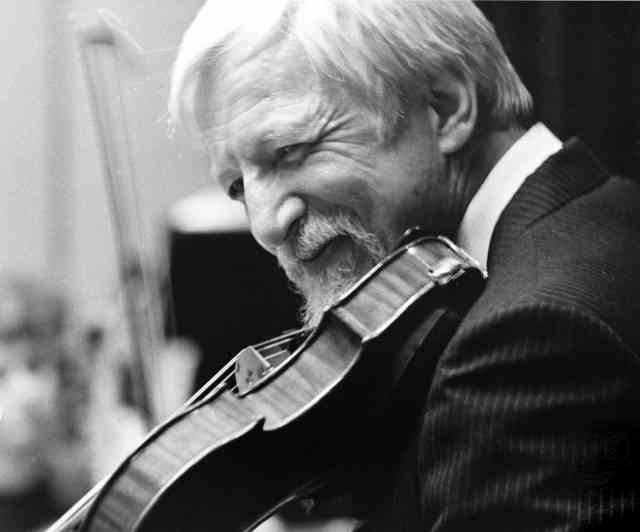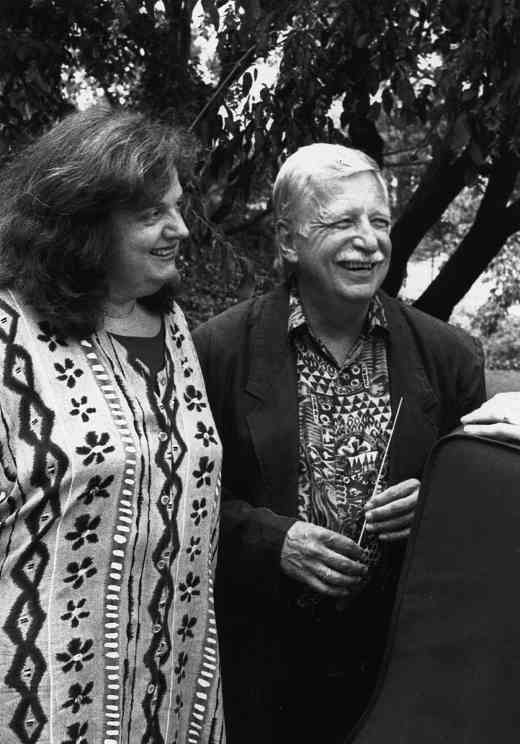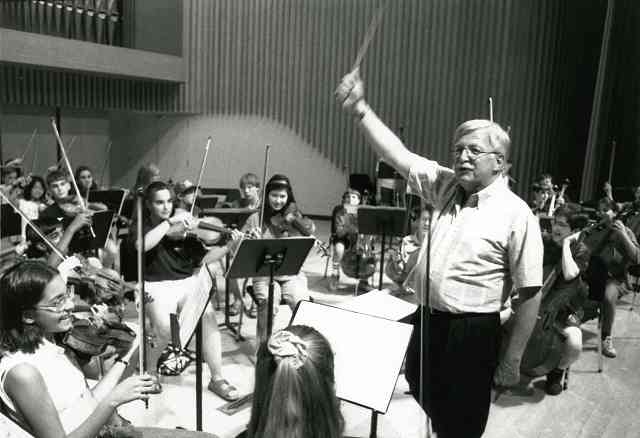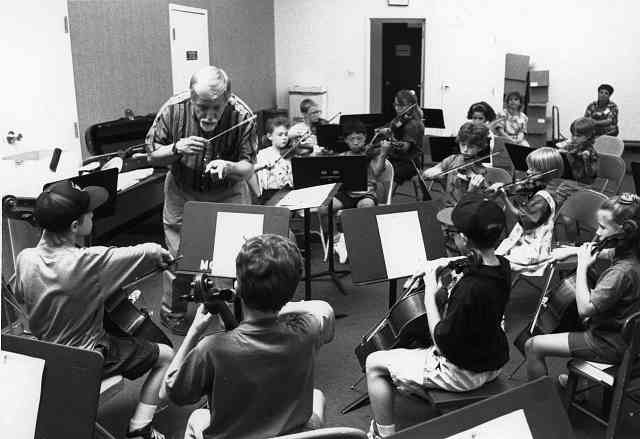David Einfeldt Memorial Scholarship
The David Einfeldt Memorial Scholarship is awarded to an individual studying conducting or Suzuki viola teacher training.
Biography
David Einfeldt was born in Hume, NY. He graduated from Ithaca College in New York with a B.M. in Music Education. While residing in Ithaca, NY, David was on the faculty of Ithaca Talent Education, was the co-director of Corning Suzuki Strings, the conductor of the Corning Philharmonic Youth Orchestra and the Northeast Pennsylvania Philharmonic Youth Orchestra.
In 1987, David and his wife, Teri, moved to Hartford, CT, where he taught violin and viola at The Hartt School Community Division, taught Suzuki Viola Pedagogy at The Hartt School, served as Music Director and Conductor of Suzuki Orchestras, and was the co-director of the Hartt Suzuki Institute.
An active clinician, David taught and conducted young students throughout the United States, Puerto Rico, Canada, and Australia. David was also an active performer, playing viola in the Northeast Pennsylvania Philharmonic, the Miami Philharmonic, Syracuse Symphony, Cayuga Chamber Orchestra, Binghamton Symphony, Broome County Pops Orchestra, Catskill Symphony, Utica Symphony, and Corning Philharmonic.
David was a long-time general member as well as a Board member of the Suzuki Association of the Americas, and was a member of American String Teachers Association and American Federation of Musicians Union Local 400 and Local 120.
David was a respected colleague, mentor, friend, father-figure, and a gifted and beloved teacher to children all over the world, having taught and conducted at many institutes, including Chicago Suzuki Institute, Columbus Suzuki Institute, Denver Suzuki Institute, Fairbanks Suzuki Institute, Guelph Suzuki Institute, Hartt Suzuki Institute, Ithaca College Suzuki Institute, Ogontz Suzuki Institute, Orono Suzuki Institute, Ottawa (Kansas) Suzuki Institute, Snow Mass Suzuki Institute, Stanford Advanced Suzuki Institute, Suzuki Association of Greater Washington Suzuki Institute, and Sweet Briar College Suzuki Institute.
David Einfeldt’s Philosophy of String Orchestra
The key to young string orchestras is choosing literature that does not exceed the technical capabilities of students at a particular orchestra level, and that is musically and chronologically appropriate, thus assuring a high level of performance. It is most important that conductors of young orchestras place the musical and technical needs of their students ahead of their own aspirations to conduct major works. It is also imperative that conductors be patient and teach young orchestra players in a step-by-step progression that is consistent with their technical and musical development. By doing so, as the students mature they will be able to perform major works more naturally. A student orchestra trained in this manner is a happy and confident group which welcomes the challenge of progressively more advanced literature and is capable of competent sight-reading of new works.
One aspect of Dr. Suzuki’s genius was his development of a repertoire that built upon technical and musical skills mastered in previous pieces. A successful conductor will employ the same philosophy, sequencing orchestral pieces in a similar manner. If astute choices are made in the area of repertoire, the development of orchestral skills will parallel the development of students from a well-taught private studio.
There is a wealth of fine repertoire from great composers for all levels of string orchestra. For many generations, arrangers have provided simplified versions of the masterworks of orchestral literature. Sifting through these arrangements requires vigilance on the part of the conductor as some are better than others. In more recent times, many music educators and composers have written original works that teach orchestral skills at all levels. Choose wisely. Know your scores and your group before finalizing your repertoire.
In the Hartt Suzuki Orchestra Program, a great deal of care and planning was employed in setting up the chronological teaching steps that ensured a quality string orchestral program. At the inception of the string orchestra program, there were four orchestras: Reading Orchestra, for students of ages 6 through 8 who had demonstrated a basic knowledge of reading (typically about mid-Book 2); Intermediate Orchestra, for students of ages 7 through 9 who had progressed to Book 4 (violin) or mid-Book 3 (viola and cello); Vivace, for students of ages 8 through 11 who had passed a sight-reading audition and who had completed the Vivaldi g minor Concerto (violin) or Book 4 (viola and cello); and Opus 89, for students of ages 11 through 16 who had passed a sight-reading audition and who had completed the Bach a minor Concerto (violin) or the Bach G Major Cello Suite (viola and cello).
Postscript: The Hartt Suzuki Orchestra Program has remained a dynamic one, responding to the varying number and level of students over the years. While Opus 89 remains as the culmination of the Hartt Suzuki String Orchestra Program, the number of lower orchestras, their names, and their age guidelines continues to change to meet the needs of the students. In recent years, Opus 89 has performed one orchestral piece for full orchestra per year, adding wind, bass, and percussion students as necessary from other areas of the Hartt Community Division.
Tributes
“David Einfeldt was the quintessential youth orchestra conductor. He was an inspiring man, both firm and fair. He loved working with children of all ages, and he was equally passionate about all repertoire, whether “March of the Metro Gnome” or Tchaikovsky’s “Serenade for Strings.” David devised a brilliant application of the techniques learned in the Suzuki repertoire to transfer knowledge and musicianship quickly and easily into an orchestral setting. With rehearsals tempered by both humor and an appreciation for the joy that the children felt in their accomplishments, it was no surprise that the students rushed to his class and verily bounced on their way out! Yet…the most powerful thing about David was that he recognized the person you were on that day, and then proceeded to treat you as the person you might become. The David Einfeldt Memorial Scholarship honors that hope and belief in our potential for excellence.”
—Kirsten Marshall, violin
Director of Orchestral Programs and Violin Instructor, Ithaca Talent Education, Ithaca, NY
“David Einfeldt’s passion for music and teaching was contagious. He had a major impact on my life as conductor of the Northeastern PA Philharmonic Orchestra during the 1970’s. He is the reason that I decided to make music my life’s career. He had a way of bringing out the best in all the musicians he taught. Some of the thoughts that come to mind when I think of David are his gentle smile, nurturer, strong desire for excellence, friend, and mentor. His legacy goes on in all of the students and colleagues who had the honor of knowing him.”
—Jean Supplee Brubaker, cello
Administrator and Cello Faculty, Suzuki School for Strings, Plains, PA
Northeast PA Philharmonic Youth Orchestra alumna
“David had a sort of musical energy that inspires me to this day. His warmth and commitment were untouchable. But what is my lasting memory? Laughter while playing. There was no separation for him—life was music. For that I can never thank him enough.”
—Rebecca Merblum, cello
String Department Chair, Pasadena Conservatory
avid freelance and chamber musician; former member Azmari Quartet
Hartt Suzuki Strings alumna
“David was a teacher who asked a lot from his students. He was demanding because he wanted us to achieve everythingthat we could—to concentrate more, to play a bit more together or a bit more beautifully. His smile and his joy when we produced what he had asked for were an incredible motivation. The last time I saw David, he coached our quartet and told us “see you later!” as he left the room. Every time I give myself or my students a little extra push to achieve something more, I feel as though I have seen him again.”
—Emily Yaffe, viola
Director, International Community Music School, Basel Switzerland
Hartt Suzuki Strings alumna
“My twin sister and I had the privilege of studying with David when he was the conductor of the Corning Philharmonic Youth Orchestra. David taught us an appreciation of each musician’s individual role in bringing an orchestral performance to life. He had patience, tolerance, a good sense of humor, and a passion for helping us reach our full potential, which was not always an easy task with distracted teenagers. David was truly an inspiration and we are so blessed that he was part of our musical education.”
—Mary Whitney Sperling and Sarah Whitney, violins
Corning Philharmonic Youth Orchestra alumni
“I have David to thank for introducing me to the world of chamber music. That world was to later become my life, but even more importantly, the people in it were to become my family. David was far more than a teacher to me and I remain forever grateful for those formative years.”
—Christina Merblum Bollschweiler, violin
Camerata Bern, Zurich, Switzerland
Hartt Suzuki Strings alumna
“David Einfeldt remains a very strong influence in my life, as he is the person who taught me the value of playing with deep feeling. Whenever I only wanted to play fast, he would remind me of the beauty of slow phrases filled with emotion. Though I did not pursue music as a career, his words about savoring the slow notes, and being in touch with how the music moved me and I could move the music, informed my approach to life. I learned to appreciate that which is not flashy, that which is beautiful, simple, and lovely.”
—Emily Madsen, violin
Hartt Suzuki Strings alumna
“David Einfeldt had a profound impact on my musical life, and I would certainly not be where I am today without his guidance and encouragement. He taught me not only about how to be a better violinist, but about what it means to be a leader in an ensemble which was an invaluable thing to learn at such a young age. David was a great teacher, conductor and most importantly a great human being, and I feel very lucky that I had the chance to know him.”
—Erin Keefe, violin
Concertmaster, Minnesota Orchestra
Hartt Suzuki Strings alumna
“David Einfeldt was responsible for my earliest chamber music experiences, forming and coaching my first string quartet before I was even aware such things existed. He also challenged and supported me as a young Suzuki student to play in my first orchestras and even try my hand at conducting. The combination of discipline and joy that he brought to music making at the Hartt School has stayed with me throughout my years at conservatory and into my professional life as a member of a string quartet.”
—Michael Haas, cello
Momenta Quartet
Hartt Suzuki Strings alumnus
“Some of my most memorable experiences as a young musician came about thanks to David Einfeldt who had a huge influence on my early life. David took great initiative to invite me to be a “ringer” cellist in various regional youth orchestras he conducted during my high school years. This included driving me back and forth to the various rehearsals and concerts. From David, I got a taste of life as a professional musician and learned a lot about responsibility. He treated me as an adult; probably the first such “grown up” to place this level of trust in me. Later on, David recommended me to a number of professional gigs. I will never forget his generosity and youthful spirit. I can only hope to return that level of incredible mentorship to young people in my field.”
—Christopher Reuning, cello
President, Reuning and Son Violin
Corning Philharmonic Youth Orchestra and Northeast Pennsylvania Youth Orchestra alumnus
“David Einfeldt was a calming presence amid all that hustle, homework, school and social angst and competitive stress—all those things that kept us high school students up late each night striving for who-knows-what. As a conductor he rarely lost his patience. He commanded respect from his students because he respected them, and because he was so “there” and present in his quiet way. He listened and cared, his students felt valued, and we cared in turn about playing and being our best. We took pride in being part of David’s orchestra, where he gave us faith in our potential. Eventually we graduated and became alumni, never forgetting this place where time stopped for many of us and where, under David’s leadership, we grew together in wordless moments where, through music, we began to understand and explore our human spirits and their transcendent possibilities.”
—Mary Wahlig Elliot, violin
Corning Philharmonic Youth Orchestra alumna
Corning Suzuki Strings alumna





